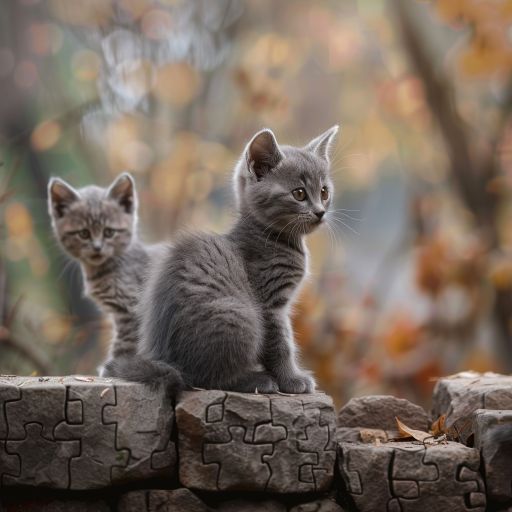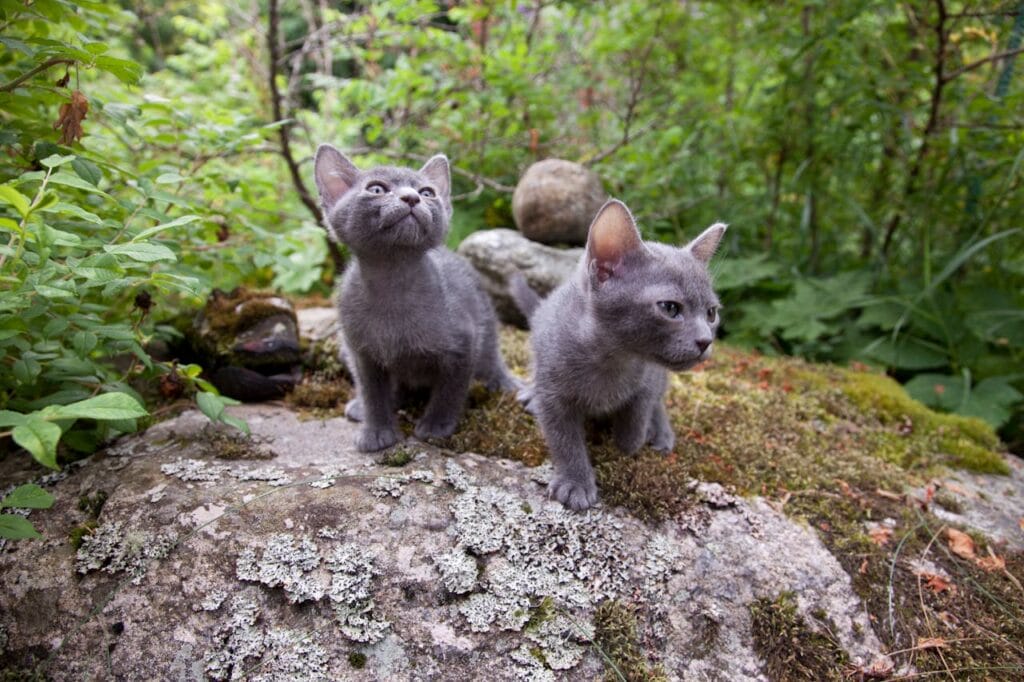Challenges of Raising a Korat Cat
The Korat, a sleek and enigmatic feline hailing from Thailand, has captivated cat enthusiasts with its distinctive heart-shaped face, shimmering green eyes, and playful personality. However, beneath this charming exterior lies a complex creature with unique needs and quirks. Raising a Korat can present certain challenges, but with the right understanding and approach, these obstacles can be gracefully overcome.
Decoding the Korat’s Vocal Repertoire: Addressing Meows and Talkativeness
Korat cats are renowned for their chatty nature. Challenges of Raising a Korat Cat: They possess a surprisingly wide vocal range, from soft meows and gentle chirps to persistent yowls and even chirpy trills. While this communicative spirit may initially seem endearing, excessive vocalization can become bothersome, especially if it occurs at untimely hours.
The key to managing your Korat’s vocal prowess lies in identifying the underlying cause. Challenges of Raising a Korat Cat. Boredom, loneliness, hunger, or even an underlying medical condition could be prompting your feline friend to engage in frequent vocalizations. Addressing these potential factors through increased playtime, interactive toys, or scheduled feeding times can help reduce unwanted meowing.
If excessive vocalization persists, consider implementing positive reinforcement techniques. Challenges of Raising a Korat Cat. Reward your Korat with treats or praise when they remain quiet, gradually extending the duration of silence between rewards. Additionally, providing enriching activities like puzzle feeders or engaging climbing structures can keep your Korat mentally stimulated and less prone to vocal outbursts.

Taming the Climber: Understanding and Managing Your Korat’s Vertical Proclivities
Korat cats are natural-born climbers, possessing an innate urge to scale any and all vertical surfaces. Challenges of Raising a Korat Cat. While their agility and grace are impressive, their climbing exploits can pose potential hazards and damage delicate furniture. To address this innate behavior, it’s crucial to provide your Korat with ample opportunities to satisfy their climbing instincts safely.
Investing in a tall cat tree or installing shelves at varying heights can offer your Korat designated climbing areas, diverting their attention away from your prized curtains or bookshelves. Challenges of Raising a Korat Cat. Strategic placement of scratching posts near tempting climbing spots further encourages appropriate scratching behavior.
When faced with persistent climbing attempts on off-limits surfaces, utilize gentle but firm redirection techniques. Challenges of Raising a Korat Cat. Picking your Korat up and placing them near their designated climbing structures while offering an engaging toy can effectively guide them towards acceptable behavior. Consistency and positive reinforcement are key to shaping your Korat’s climbing habits.
Combating the Hairball Blues: Navigating the Korat’s Grooming Needs
Korat cats possess a short, single-layered coat that requires minimal grooming. However, despite their low-maintenance reputation, Korats are prone to hairball formation. Challenges of Raising a Korat Cat. Regular brushing, especially during shedding seasons, is crucial to remove loose hair and prevent it from accumulating in your cat’s digestive tract.
Invest in a high-quality grooming brush designed for short-haired cats and establish a regular brushing routine. Aim for at least two brushing sessions per week, increasing the frequency during shedding seasons. Challenges of Raising a Korat Cat. Be gentle but thorough, focusing on areas where hair tends to accumulate, such as the back, belly, and chest.
In addition to regular brushing, consider incorporating hairball-reduction treats or supplements into your Korat’s diet. Challenges of Raising a Korat Cat. These products contain ingredients that help break down and eliminate hairballs, reducing the discomfort and potential health risks associated with their formation.
Unraveling the Mystery of the Litter Box: Addressing Bathroom Behavior Challenges
Korat cats are generally fastidious creatures, renowned for their cleanliness and meticulous litter box habits. Challenges of Raising a Korat Cat. However, certain factors can disrupt their litter box etiquette, leading to unpleasant surprises outside the designated area.
Stress, changes in their environment, or even underlying medical conditions can contribute to litter box issues. Challenges of Raising a Korat Cat. If your Korat suddenly starts avoiding the litter box or exhibiting inappropriate elimination behavior, the first step is to rule out any potential medical causes. Schedule a visit with your veterinarian to ensure your feline friend is in good health.
Once medical causes are ruled out, focus on creating a stress-free and inviting litter box environment. Ensure the litter box is large enough for your Korat and cleaned regularly. Challenges of Raising a Korat Cat. Experiment with different types of litter, keeping in mind that most Korats prefer fine-grained, clumping litter. Place the litter box in a quiet, easily accessible location away from your cat’s food and water bowls.
If your Korat continues to exhibit litter box avoidance, consider seeking guidance from a feline behaviorist. Challenges of Raising a Korat Cat. They can help identify and address any underlying behavioral issues contributing to the problem.
Harnessing the Power of Play: Engaging Your Korat’s Energetic Spirit
Korat cats are playful and energetic creatures who require ample physical and mental stimulation to thrive. Challenges of Raising a Korat Cat. Failure to provide sufficient enrichment can lead to boredom, destructive behavior, and even weight gain.
Regular interactive play sessions are essential for keeping your Korat entertained and physically active. Engage your feline friend with feather wands, laser pointers, or interactive toys that challenge their hunting instincts. Challenges of Raising a Korat Cat. Consider hiding treats or toys around the house for your Korat to discover, encouraging them to engage in independent play.
Rotating your Korat’s toys regularly and introducing new ones helps maintain their interest and prevents boredom. Challenges of Raising a Korat Cat. Vertical structures like cat trees or climbing towers provide opportunities for climbing and exploration, while puzzle feeders stimulate their minds and challenge their problem-solving abilities.
Building Trust and Understanding: Fostering a Strong Bond with Your Korat
Korat cats may appear reserved initially, but beneath their quiet exterior lies a loyal and affectionate nature. Challenges of Raising a Korat Cat. Building a strong bond with your Korat requires patience, understanding, and respect for their individual personality.
Create a comfortable and trusting environment for your Korat. Provide them with designated resting areas and hiding spots where they can retreat when feeling overwhelmed. Avoid forcing interaction or overwhelming them with excessive attention. Challenges of Raising a Korat Cat. Instead, let your Korat initiate contact and gradually build trust through gentle petting, soft spoken words, and interactive play.
Respect your Korat’s boundaries and avoid overwhelming them with affection. Korats often prefer slower interactions and may need time to warm up to new people or situations. Challenges of Raising a Korat Cat. Pay attention to their body language and subtle cues to understand their moods and preferences.

Unlocking the Secrets: Understanding the Korat’s Unique Personality
Korat cats possess a distinct personality, often described as intelligent, playful, and deeply devoted to their humans. Challenges of Raising a Korat Cat. Understanding and appreciating their unique characteristics is crucial for creating a harmonious and fulfilling relationship with your feline companion.
Korats are known for their strong attachment to their primary caregiver, often forming an almost dog-like bond. Challenges of Raising a Korat Cat. They exhibit loyalty and affection, often following their humans around the house and enjoying close interaction. Respect this special connection and reciprocate their affection with consistent care and attention.
Embrace your Korat’s playful side by engaging them in regular interactive play sessions. These intelligent felines enjoy games that challenge their minds and test their agility. Challenges of Raising a Korat Cat. Provide them with a variety of toys and activities to keep them entertained and stimulated.
While Korats may appear quiet and reserved at times, their loyalty and affection make them exceptional companions for those who appreciate their unique personalities. Challenges of Raising a Korat Cat. Embrace the challenges and rewards of raising a Korat, and you’ll discover a truly exceptional feline friend who will enrich your life in countless ways.
There’s a certain elegance and grace that comes with owning a Korat cat, but along with their beauty, there are some potential challenges you may face. From their high intelligence and curiosity to their need for attention and mental stimulation, raising a Korat cat requires dedication and understanding. Challenges of Raising a Korat Cat. In this blog post, we will explore some common challenges you may encounter when caring for a Korat cat and provide tips on how to overcome them to ensure a happy and healthy relationship with your feline companion.
Temperament and Personality Traits
Independent Nature
Raising a Korat cat can be challenging due to their independent nature. Challenges of Raising a Korat Cat. These cats are known for being self-reliant and may not always seek constant attention from their owners. This behavior can sometimes be misunderstood as aloofness, but it’s essential to recognize that it is simply a characteristic of their personality.
Affectionate but Demanding
Demanding attention when they want it, Korat cats can also be incredibly affectionate. They enjoy cuddling up with their owners and will often follow you around the house to be close to you. However, they have a bit of a unique way of showing their affection, which can sometimes come off as demanding.
Despite their demanding nature, Korat cats can form strong bonds with their owners and become loyal companions. They thrive on interaction and will likely want to be involved in your daily activities, whether it’s lounging on the couch with you or “helping” you work on your computer.

Grooming and Coat Maintenance
Short but Dense Coat
The Korat cat has a short but dense coat that requires minimal grooming. The good news is that their coat is relatively low-maintenance compared to other long-haired breeds. However, don’t be fooled by its short length – their coat can still shed, so regular grooming is necessary to keep it healthy and shiny.
Regular Brushing Requirements
An necessary part of grooming your Korat cat is regular brushing to help manage shedding and keep their coat in tip-top condition. While the Korat’s coat is short, it is dense, and regular brushing can help prevent mats and tangles from forming. Aim to brush your Korat at least once a week to remove loose fur and distribute natural oils for a sleek and glossy coat.
Short-haired breeds like the Korat may not require as much grooming as long-haired cats, but regular brushing is still crucial for their overall well-being. It also serves as a bonding experience between you and your feline companion, helping to strengthen your relationship and keep your Korat looking and feeling its best.

Health Concerns
The
Hypokalemia (Low Potassium Levels)
condition can be a concern in Korat cats. The low levels of potassium can lead to weakness, fatigue, and muscle cramps in your feline companion. If left untreated, it can escalate to more severe issues. It is vital to provide a balanced diet for your Korat cat to ensure they receive an adequate amount of potassium.
Patellar Luxation (Kneecap Dislocation)
For the
Patellar Luxation (Kneecap Dislocation)
issue, it is crucial to keep an eye on your Korat cat’s mobility. This condition occurs when the kneecap dislocates, causing discomfort and difficulty in movement for your pet. Regular check-ups with your veterinarian can help in early detection and management of this condition.
Luxation can cause pain and discomfort for your Korat cat. If you notice any signs of limping, favoring one leg, or difficulty in jumping, it’s important to consult your vet promptly. They can recommend treatment options, which may include medication or surgery to alleviate your cat’s discomfort and improve their quality of life.
Dietary Needs and Restrictions
Despite their petite size, Korat cats have specific dietary needs and restrictions that you should be aware of to ensure they live a healthy and happy life.
High-Quality Protein Sources
The Korat cat requires a diet rich in high-quality protein sources to maintain their sleek coat and lean muscle mass. Make sure to choose cat food that lists meat, poultry, or fish as the first ingredients to meet their protein requirements. Avoid foods that contain fillers like corn or soy, as these may not provide the necessary nutrients for your Korat cat.
Limited Carbohydrate Intake
Restrictions on carbohydrate intake are crucial for Korat cats as they are prone to weight gain and obesity. High-carb diets can lead to health issues such as diabetes and joint problems in these felines. Be sure to select cat food that is low in carbohydrates and focus on protein and healthy fats instead. Additionally, monitor your Korat cat’s portion sizes to prevent overeating and weight gain.
Carbohydrates are not a significant part of a Korat cat’s natural diet, as they are obligate carnivores. Their bodies are designed to thrive on a diet that is primarily protein-based, making it important to limit their carbohydrate intake.
Environmental Enrichment
Unlike some other cat breeds, Korat cats are highly intelligent and require mental stimulation and exercise to keep them happy and healthy. It is vital to provide your Korat cat with ample opportunities for enrichment to prevent boredom and behavioral issues.
Providing Stimulation and Exercise
An active and playful breed, Korat cats enjoy interactive toys, puzzle feeders, and climbing structures. These activities not only engage your cat’s mind but also provide vital physical exercise. Regular play sessions with toys such as laser pointers or feather wands can help satisfy your Korat’s natural hunting instincts and keep them mentally sharp.
Creating a Korat-Friendly Home Environment
On top of providing enrichment through toys and play, creating a cat-friendly environment in your home is crucial for your Korat’s well-being. Make sure to have plenty of vertical space for climbing and perching, as Korat cats love to be up high to observe their surroundings. Providing cozy hiding spots and scratching posts will also cater to your Korat’s innate behaviors.
A Korat-friendly home environment includes safe and accessible spaces for your cat to explore and relax. Consider adding a variety of textures, such as soft blankets and sturdy scratching posts, to meet your Korat’s tactile needs. Additionally, providing multiple litter boxes in quiet and private locations can help prevent accidents and ensure your Korat feels comfortable in their environment.
Socialization and Training
Once again, the challenges of raising a Korat cat may arise in their socialization and training. It is crucial to start socializing and training your Korat cat from a young age to ensure they grow up to be confident and well-behaved companions.
Early Socialization for Confidence
To help your Korat cat build confidence, make sure to expose them to various people, environments, and experiences early on. Introduce them to different sounds, textures, and situations gradually, so they learn to adapt and feel comfortable in various settings. Encourage positive interactions with people and other animals to prevent shyness or fearfulness as they mature.
Positive Reinforcement Training Methods
With their intelligent and sensitive nature, Korat cats respond well to positive reinforcement training methods. Use treats, praise, and rewards to encourage good behavior and discourage unwanted actions. For example, if your Korat cat uses their scratching post instead of furniture, reward them with treats or extra playtime. Consistency and patience are key to successfully training your Korat cat.
Positive reinforcement training methods focus on rewarding desirable behaviors rather than punishing unwanted ones. By reinforcing positive actions, you can build a strong bond with your Korat cat based on trust and understanding. Remember to always use gentle and loving approaches when training your Korat cat to ensure they feel safe and supported.
Conclusion
So, now that you are aware of the potential challenges of raising a Korat cat, you can better prepare yourself for welcoming one into your home. Remember to provide plenty of mental and physical stimulation, establish a routine for playtime and feeding, and be patient as your Korat cat adjusts to its new environment. With proper care and attention, you can overcome these challenges and enjoy a loving and rewarding relationship with your Korat cat.
By understanding the unique characteristics and needs of the Korat breed, you can tailor your approach to ensure a happy and healthy life for your feline companion. Embrace the challenges as opportunities to bond with your cat, learn more about their behavior, and provide the best possible care. With dedication and love, you can navigate the potential challenges of raising a Korat cat and create a strong and lasting connection with your furry friend.



